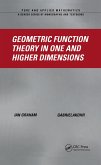This book makes the subject of complex analysis accessible to a broad audience. The complex numbers are a somewhat mysterious number system that seems to come out of the blue. It is important for students to see that this is really a very concrete set of objects that has very concrete and meaningful applications.
Features:
- This new edition is a substantial rewrite, focusing on the accessibility, applied, and visual aspect of complex analysis
- This book has an exceptionally large number of examples and a large number of figures.
- The topic is presented as a natural outgrowth of the calculus. It is not a new language, or a new way of thinking.
- Incisive applications appear throughout the book.
- Partial differential equations are used as a unifying theme.
Dieser Download kann aus rechtlichen Gründen nur mit Rechnungsadresse in A, B, BG, CY, CZ, D, DK, EW, E, FIN, F, GR, HR, H, IRL, I, LT, L, LR, M, NL, PL, P, R, S, SLO, SK ausgeliefert werden.









